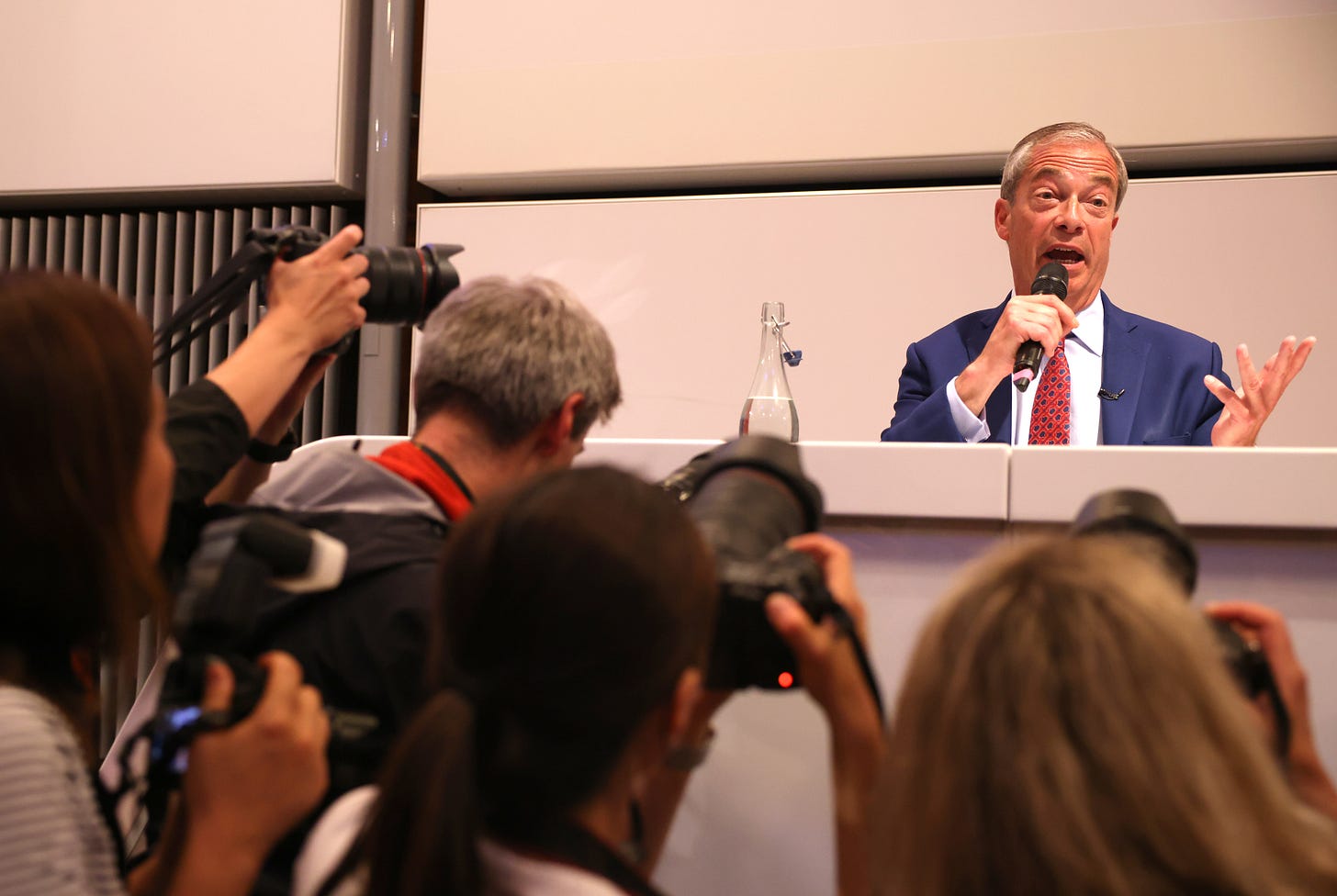British Politics Goes Continental
Labour won big. But the rise of small parties proves we've entered a new era.

On the surface, the story of the British election is simple.
After 14 years of chaotic Tory rule—a period in which the country was governed by five different prime ministers, from David Cameron to Rishi Sunak—Britain was desperate for change. Keir Starmer’s Labour Party won a decisive majority in Parliament yesterday in large part because support for the Conservatives collapsed. It was one of those inevitable pendulum swings that everyone knew was coming.
We Brits like to see ourselves as fundamentally different from our European neighbors. Our politics is generally less volatile, less prone to extremes. Not for us the fractured electoral landscape of a country like France, where a raft of parties on the far left and the far right has destroyed Emmanuel Macron’s majority in the Assemblée nationale. We have a first-past-the-post system that makes it hard for small or ideologically extreme parties to succeed. Even when the electoral pendulum takes a big swing, it follows a predictable pattern, and has done for 100 years: from Labour to the Conservatives, or (as was the case this time around) from the Conservatives to Labour.
Scratch beneath the surface, however, and the story gets more complicated. Indeed, this election may mark the moment when British politics, which has gradually become more European over the past decade or so, went fully continental.
Consider these three facts.
First, while Labour won a resounding majority, Britons have never been more put off by the two major parties. Sixty years ago, Labour and the Conservatives received almost 90% of the vote between them; this year, they got 57%, their lowest combined share of the vote since Labour first emerged as an electoral force over a century ago. The Labour Party won the third largest majority of any party in the past 100 years, with 63% of all seats in the House of Commons. But it accomplished this feat despite winning a relatively small share of the popular vote, 34%.
Second, voters are increasingly willing to search for alternatives to the two main parties, including the Green Party on the left and the Liberal Democrats in the center. The main beneficiary of this vote-switching, however, was a right-wing populist party whose politics follows a blueprint familiar from the continent. Nigel Farage’s Reform UK won over four million votes, or about 14 percent of the total, topping the record previously set by its predecessor, the United Kingdom Independence Party (UKIP), in 2015.
Farage ran on promises to cut taxes and scrap net-zero environmental targets. But his most important pledges were on immigration: He promised to withdraw Britain from the European Convention on Human Rights, to halt entirely the resettling of refugees, and to freeze “non-essential” immigration in order to save jobs and protect Britain’s “culture, identity and values.” While, in another peculiar consequence of the first-past-the-post system, the 14 percent of the popular vote Farage earned will only give it five seats, it marks the first time that a party on the ideological right of the Conservatives has gained a real foothold in Parliament.1
Ironically, Reform’s success was also a big reason for the good fortunes of Labour and the Liberal Democrats—who only managed to take so many seats off the Tories because Reform split the right-wing vote. Farage will attempt to build on this success, and could even conceivably stage a hostile takeover of the Conservative Party down the line. Anyone who still believes that the rise and rise of a party like France’s National Rally couldn’t happen in the UK needs to think again.
Third, the young are no longer reliably progressive. Britain and America have of late been relative outliers, in that young voters in these countries were overwhelmingly left-wing, even while similarly young voters in Germany and France increasingly voted for far-right parties. According to some recent polls, this no longer appears to be the case. Over one in five voters below 25 were planning to vote for Reform according to one recent poll; another poll showed that the party are second among 16 and 17 year olds, way ahead of the Conservatives. While Labour came top among young voters, young people who are right wing are now far more likely than their parents to be very right wing.
Combined, these three trends show that although Britain has left the European Union, our politics is no longer so different from the volatile, ideologically diffuse spectacle we often see on the continent.
There are, nonetheless, good reasons for Brits to be cautiously optimistic. The election result is a chance to solve many of the problems—chronic underinvestment, stagnant wages and desultory productivity growth—that makes this island (as Sam Kriss argued in a polemical article in our pages yesterday) feel so crummy right now. As cautious as Keir Starmer often appeared on the campaign trail, it’s likely that he’ll now pursue major reforms aimed at tackling these problems.
But, to me, the best news from yesterday’s election is that British voters are so much more changeable than those in many other democracies. Two years ago, Conservative prime minister Boris Johnson was musing about remaining in power until the 2030s; but, fed up with the incompetence of the Tories, millions of swing voters were willing to jump ship, delivering a decisive change in government.
That so many voters are willing to change their minds is a good thing for democracy: The system only works when voters’ allegiance to a particular party or leader does not become tribal; when their support is conditional on a government delivering real results—and abstaining from doing stupid shit. In this regard, the contrast with the United States, where both Democrats and Republicans now appear to have a stranglehold over their respective voters, is stark.
Luke Hallam is senior editor at Persuasion.
Follow Persuasion on Twitter, LinkedIn, and YouTube to keep up with our latest articles, podcasts, and events, as well as updates from excellent writers across our network.
And, to receive pieces like this in your inbox and support our work, subscribe below:
There's The Democratic Unionist Party (DUP), a socially conservative party from Northern Ireland which has long returned a handful MPs to Parliament. But they don't run candidates in the rest of the UK, and apart from a brief period propping up Theresa May's government in 2017 have little impact on national politics.




The DEI Diva: Harris. Had Biden chosen a better running mate we would not be in this situation.
Here in the states Democrats (and possibly Republicans) also have not yet acknowledged that many young people, especially men, are trending to the right. Witness that Democrats within the Beltway are seriously considering nominating Harris should Biden step aside. The problem would seem to be that many younger voters have not found a place or are not welcome within the silos that have become the Democratic and Republican parties.